|
|
|
Sort Order |
|
|
|
Items / Page
|
|
|
|
|
|
|
| Srl | Item |
| 1 |
ID:
139636


|
|
|
|
|
| Summary/Abstract |
This article considers the fracturing of “community” and the turn to litigation in the wake of nominally settled land restitution claims in South Africa. We describe emergent incongruence between groups of claimants, the projects of restitution, and the new legal entities that represent the claimants. As a result, discontented South African land claimants are challenging the new legal entities created in the restitution process, rather than the state and private sector actors upon which development-oriented Settlement Agreements depend. We focus on two of the earliest and largest land claims involving urban land and protected areas, District Six and Dwesa-Cwebe, but our argument extends beyond these cases. We then consider the implications of increased claimant litigation for the governance of relations between claimants and the state, and the management of dissent in the context of neo-liberalization. In concluding, we argue that struggles among claimants undermine the potential for more concerted action to address the shortcomings of restitution.
|
|
|
|
|
|
|
|
|
|
|
|
|
|
|
|
| 2 |
ID:
123514
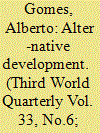

|
|
|
|
|
| Publication |
2012.
|
| Summary/Abstract |
The goal of this article is to outline an indigenous form of social ecology offered as an alternative development model. Based on the normative system of the Orang Asli (Malaysian Aborigines), this model is characterised by various social, cultural and ecological ideas and practices undergirding the interconnected conditions of equality, sustainability and peace, which engenders a better life for all within the community. I contend that this model will provide lessons on how we might develop a normative paradigm to serve as an alternative to the current ecological and socially unsustainable mainstream and neoliberal development policy and practice, obsessed with the attainment of economic growth and greater market integration.
|
|
|
|
|
|
|
|
|
|
|
|
|
|
|
|
| 3 |
ID:
113841
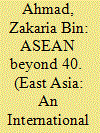

|
|
|
|
|
| Publication |
2012.
|
| Summary/Abstract |
The vitality of ASEAN derives from its core. Until the mid 1990s, Indonesia, Malaysia, Singapore and Thailand provided the dynamism of ASEAN and their national leaders the regional leadership so necessary for the Association's existence. Entering its fifth decade, the Association seems posited at a "mid-life crisis". The ASEAN Charter has proposed bold ideas in community-building. Yet the "loss" of a strong leadership impetus has cast a shadow of uncertainty over the extent to which ASEAN may reduce the gap between the richer and poorer nations of Southeast Asia. The extant two-tiered nature of ASEAN is problematic to its cohesion as each with its defining set of characteristics and views of regionalism. Can the more structured approach make up the leadership deficit and enable ASEAN to reconcile the division in its quest for regional unity? The prolonged Myanmar embarrassment seems to suggest an unconfident "yes" at best.
|
|
|
|
|
|
|
|
|
|
|
|
|
|
|
|
| 4 |
ID:
185948
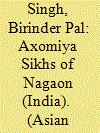

|
|
|
|
|
| Summary/Abstract |
In the villages of Nagaon district of Assam(India), Axomiya Sikhs are residing for the past two centuries. They are the believers and practitioners of their religion though not averse to local customs and festivals. They are immersed in the language and culture of Assam and many have got name and fame in their respective fields including Assamese literature. They claim to be the descendants of Sikh soldiers from Punjab sent there by Maharaja Ranjit Singh to help the Ahom ruler in 1820. The present paper explores the question of their social, religious and linguistic identity. They were contented with themselves until they interacted with the Punjabi Sikhs in Assam, relatively recent settlers, who call them ‘duplicate Sikhs’. They are now in a dilemma with regard to their Sikh identity. The data are collected from a sample of 365 respondents. This is the only empirical study after Medhi’s work in 1989.
|
|
|
|
|
|
|
|
|
|
|
|
|
|
|
|
| 5 |
ID:
103542
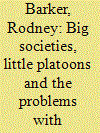

|
|
|
|
|
| Publication |
2011.
|
| Summary/Abstract |
Conservative talk of a 'big society' is one more mutation of the unstable family of pluralism. It is a large family, with both benign and progressive left wing members and rogue right wing black sheep. The progressive contribution has been substantial, but pluralism is not a homogeneous ideology or set of policies, and the single word conceals stresses and irreconcilable oppositions in theory and practice. An examination of this variety gives clues to the latest contributions, and to some of the more regressive uses to which pluralism can be put. The left needs both to insist on its own major contribution to progressive pluralism, and to beware of wolves in pluralist clothing.
|
|
|
|
|
|
|
|
|
|
|
|
|
|
|
|
| 6 |
ID:
075667
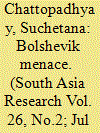

|
|
|
|
|
| Publication |
2006.
|
| Summary/Abstract |
This article examines the impact of the anti-Bolshevik surveillance network created by the colonial state on the urban political milieu of Calcutta during the late 1910s and the early 1920s. The first socialists in Calcutta (1921-24), predominantly Muslims, emerged from the ranks of urban intellectuals and political activists. The article argues that the state's insistence on labelling various social and political segments, including early socialists, as political tools of Moscow demonstrated its inability to grasp the local responses to an international current. It is shown that despite enforcement of various strategies, which tried to anticipate and prevent the spread of socialism, the colonial state failed to counter the emergence of the left in the city.
|
|
|
|
|
|
|
|
|
|
|
|
|
|
|
|
| 7 |
ID:
184117
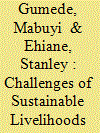

|
|
|
|
|
| Summary/Abstract |
This paper explores the extent to which land ownership through restoration results in non-sustainability in the Nonoti community in South Africa. During the apartheid era, Black communities were evicted from their ancestral land to make way for tourism development, though those lands were later repossessed by their original owners. This study aims at exploring the challenges of post-settlement after land restoration to new landowners in the Nonoti Beach resort. This paper is anchored on the sustainable livelihoods theoretical framework to measure the extent to which land can enhance socio-economic development. This study adopted a qualitative research design using in-depth interviews and focus groups. The sample of this study was drawn from the Nonoti local community members and representatives of the government agencies in charge of land restoration. The study concludes that landowners should be capacitated through training and skills development to live sustainably on the land they have acquired through the land claims process.
|
|
|
|
|
|
|
|
|
|
|
|
|
|
|
|
| 8 |
ID:
108382
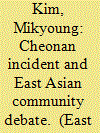

|
|
|
|
|
| Publication |
2011.
|
| Summary/Abstract |
The East Asian community debates project the region as one integral unit. Rapidly shifting landscapes explain the tension between the old order and emerging hierarchy where North Korea plays a crucial role. This paper analyzes North Korea's place in the East Asian community debates by examining the regional governments' reactions to the Cheonan incident. The responses and circumstances of South Korea, Japan and North Korea to the sunken ship incident demonstrate three dynamics. First, domestic political needs of the regional government supersede normative Community rhetoric. Second, manageability of the North Korean regime will determine the next regional hegemon. And third, the community debates need to include North Korea for viability.
|
|
|
|
|
|
|
|
|
|
|
|
|
|
|
|
| 9 |
ID:
190928


|
|
|
|
|
| Summary/Abstract |
The paper qualitatively examines the role of community policing as a panacea to insecurity in Nigeria through documentary sources. It is argued that the social and political environment in Nigeria is pervaded by the Boko Haram uprising in the North East zone, banditry and cattle rustling in the North West and North Central zones, ethnic militia in the South South and South East zones and armed robbery and ritual killings in the South West zone. Nigeria has become one of the most unsafe places to live in the world, the rate of killings suggesting that the Nigeria Police Force (NPF) – an organisation created for ensuring internal peace and cohesion – has failed in its statutory responsibilities. It is concluded that community policing which ensures the collaboration of citizens with security agents is the right approach to alleviating the internal security crisis in Nigeria.
|
|
|
|
|
|
|
|
|
|
|
|
|
|
|
|
| 10 |
ID:
027036
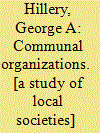

|
|
|
|
|
| Publication |
Chicago, University of Chicago Press, 1968.
|
| Description |
x, 374p.
|
|
|
|
|
|
|
|
|
|
|
|
Copies: C:1/I:0,R:0,Q:0
Circulation
| Accession# | Call# | Current Location | Status | Policy | Location |
| 004443 | 305/HIL 004443 | Main | On Shelf | General | |
|
|
|
|
| 11 |
ID:
173444
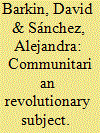

|
|
|
|
|
| Summary/Abstract |
The hope for a unique revolutionary actor in the twentieth century evaporated as a result of the weaknesses of social organisations. This paper examines the potential of an almost-forgotten group of revolutionary actors – collectively organised and deliberately involved in processes of social and productive transformation with a legitimate claim to territory – whose present-day activities involve them in concerted processes to consolidate a different constellation of societies on the margins of the global capitalist system. Indigenous and peasant communities throughout the Americas are self-consciously restructuring their organisations and governance structures, taking control of territories they claimed for generations. They are also reorganising production to generate surplus, assembling their members to take advantage of underutilised resources and peoples’ energies for improving their ability to raise living standards and assure environmental conservation and restoration. These communities are not operating in isolation. They coordinate activities, share information and build alliances. Hundreds of millions of people are participating in this growing movement; they occupy much more than one-quarter of the world’s land area. There is great potential for others to join them, expanding from the substantial areas where they are already operational. Global social networks are ensuring that this dynamic accelerates.
|
|
|
|
|
|
|
|
|
|
|
|
|
|
|
|
| 12 |
ID:
026303
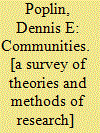

|
|
|
|
|
| Publication |
New York, Macmillan Company, 1972.
|
| Description |
vi, 313p.
|
|
|
|
|
|
|
|
|
|
|
|
Copies: C:1/I:0,R:0,Q:0
Circulation
| Accession# | Call# | Current Location | Status | Policy | Location |
| 010772 | 307.01/POP 010772 | Main | On Shelf | General | |
|
|
|
|
| 13 |
ID:
101455
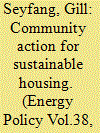

|
|
|
|
|
| Publication |
2010.
|
| Summary/Abstract |
This paper presents a new analytical framework of 'grassroots innovations' which views community-led initiatives for sustainable development as strategic green niches with the potential for wider transformation of mainstream society. This framework is applied to a low-carbon, low-impact, community-based sustainable housing initiative in the USA that pioneers straw bale housing techniques within a strong community-building ethos. The project is evaluated according to New Economics criteria of sustainable consumption, and is found to be successful at localising the construction supply chain, reducing ecological footprints, community-building, enabling collective action and building new institutions and systems of provision around housebuilding. However, viewing it as a strategic niche with aim to influence wider society, it is clear that it faces significant challenges in diffusing its ideas and practices beyond the niche. Its model is not necessarily suitable for scaling up or widespread replication; however, the scope for niche lessons to be adopted by mainstream builders is greater, given a supportive policy environment. Recognising the innovative nature of green niches at the policy level could lead to new approaches to governance of bottom-up community action for sustainable development.
|
|
|
|
|
|
|
|
|
|
|
|
|
|
|
|
| 14 |
ID:
157485
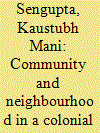

|
|
|
|
|
| Summary/Abstract |
This article on the history of neighbourhoods (para) of colonial Calcutta considers the processes through which this peculiar spatial unit emerged in the colonial city, where community identities were fostered as well as contested. Seen as a place, a secured, stable location which helped in forming the community in an alien atmosphere, the para was a liminal space, neither a purely affective unit nor an administrative category, and neither a purely public or private domain. Borrowing liberally from each register to generate a unique spatial experience, paras were at the same time deeply exclusionary and also starkly patriarchal zones. The article brings forth these various strands in the history of the neighbourhood to enrich the understanding of colonial urbanism, Bengali society and culture.
|
|
|
|
|
|
|
|
|
|
|
|
|
|
|
|
| 15 |
ID:
117602
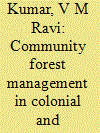

|
|
|
|
|
| Publication |
2012.
|
| Summary/Abstract |
In the past two decades, South Asia has undergone robust reforms in the forestry sector which claim to be initiating a transformation from state-centric to people-centric forest management. This shift is perceived as an important move towards decolonisation in governance processes in India. Examining the forest policies in colonial and postcolonial South India, this article finds, however, that community forest management in postcolonial India remains substantially rooted in the colonial framework of forest resource management policies. In practice, this means that exploitation of forests gives some consideration to the requirements of forest-dependent communities today, but does so now under the control of a state that fails to protect the most basic rights of many of its most vulnerable citizens. The article thus argues critically that supposedly people-centric community forest management in India is not sensitive enough to local development needs, nor indeed sufficiently protective of the basic needs of many forest-dependent people.
|
|
|
|
|
|
|
|
|
|
|
|
|
|
|
|
| 16 |
ID:
044179
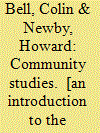

|
|
|
|
|
| Publication |
London, George Allen and Unwin Ltd., 1971.
|
| Description |
262p.
|
| Series |
Studies in Sociology
|
| Standard Number |
004300320
|
|
|
|
|
|
|
|
|
|
|
|
Copies: C:1/I:0,R:0,Q:0
Circulation
| Accession# | Call# | Current Location | Status | Policy | Location |
| 011200 | 300/BEL 011200 | Main | On Shelf | General | |
|
|
|
|
| 17 |
ID:
123069
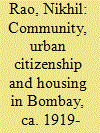

|
|
|
|
|
| Publication |
2013.
|
| Summary/Abstract |
From the late 1910s onward, co-operative housing societies in cities like Bombay offered affordable housing by using the agency of community to protect against the vicissitudes of the market. At the same time, ideas of urban citizenship premised on the liberal individual received greater attention with a broadened franchise and became increasingly linked to social rights such as affordable housing. While the community and the individual are seen as opposed to one another in the discourse of citizenship, this paper suggests that they mutually informed and constituted one another between 1919 and 1980 in ways that have enduring significance for understandings of urban citizenship.
|
|
|
|
|
|
|
|
|
|
|
|
|
|
|
|
| 18 |
ID:
091023
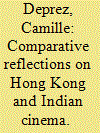

|
|
|
|
|
| Publication |
2009.
|
| Summary/Abstract |
Much research on contemporary Asian cinema is focused within national boundaries or takes an outright international approach, with few comparative studies. Historic and cinematographic similarities between Hong kong and India since the 1980s allow for a consideration of identity deconstruction and reconstruction in diaspora as seen in some of their films.The notion of vagueness becomes crucial to a nuanced view of the tendency either to withdraw into one's community or turn cosmopolitan.
|
|
|
|
|
|
|
|
|
|
|
|
|
|
|
|
| 19 |
ID:
037327
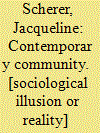

|
|
|
|
|
| Publication |
London, Tavistock Publications, 1972.
|
| Description |
xii, 155p.
|
|
|
|
|
|
|
|
|
|
|
|
Copies: C:1/I:0,R:0,Q:0
Circulation
| Accession# | Call# | Current Location | Status | Policy | Location |
| 010636 | 307/SCH 010636 | Main | On Shelf | General | |
|
|
|
|
| 20 |
ID:
120726
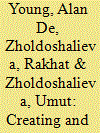

|
|
|
|
|
| Publication |
2013.
|
| Summary/Abstract |
Formal schooling was virtually non-existent before the Soviet power in nomadic Kyrgyzstan, as communal life and learning was organized informally at the household and clan level. During the Soviet period, however, educational success became an avenue to a new form of upward social and geographical mobility, and the school provided new and prestigious positions for local teachers and administrators. This paper explores how the externally imposed Soviet collectivization policies reshaped the understandings and meanings of place and community during the twentieth century, a reshaping that centrally involved redefining education and the importance of 'the school'. In the post-Soviet period, the utility of secondary and higher education in local and national labour markets has diminished, as has the power and prestige of educators. Yet the appeal of education lingers on. The authors seek to document these claims using oral histories, ethnographic interviews and participant observations in the Ylay Talaa Valley of the Kyrgyz Republic.
|
|
|
|
|
|
|
|
|
|
|
|
|
|
|
|
|
|
|
|
|